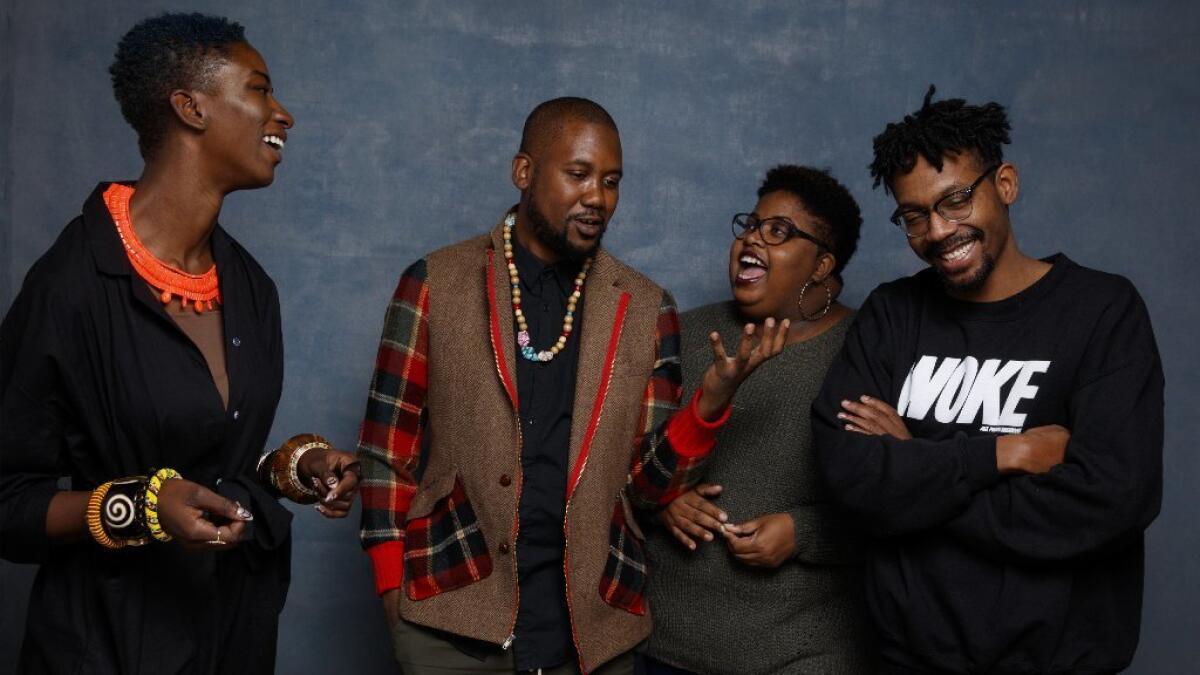True/False Film Fest: Ferguson film ‘Whose Streets?,’ from the people who filled them

- Share via
Reporting from Columbia, MO. — Sometimes a subject, an audience and a place converge in just the right way. And a combustible way.
Since the Ferguson, Mo., uprising in 2014 kick-started the Black Lives Matter movement, there have been numerous films about the criminal-justice system.
Not many, however, have taken a street-level view.
And even fewer have gotten the kind of grass-roots, where-it-all-began screening that “Whose Streets?” did over the weekend.
“If we keep the integrity of what we’re doing and tell the truth … that’s how we’re going to tell this story,” said director Damon Davis, a St. Louis native who made the documentary with Sabaah Folayan. “At end of day we really just need to think about which side we’re on.”
Davis was making his comments at True/False, the preeminent documentary film festival that took place last weekend in this Midwestern college town. Filmmakers and audience members were sitting in the same state as the Ferguson events, and the first two rows were filled with people involved in the movement.
“To people in St. Louis, I don’t even know where to start,” said Folayan, a New Yorker who joined Davis in St. Louis to make the film. “We always said we were making this film for you.” If we could make a film “that was true,” she added, “we knew it would resonate far and wide.”
“Streets” examines the activists and ordinary people (the two are sometimes synonymous) who gave voice to the black community after the killing of unarmed black 18-year-old Michael Brown by white police officer Darren Wilson in 2014.
“Whose Streets?” divides itself into five chapters as it offers a largely impressionistic account of the aftermath of the Brown killing. It aims to give an alternative view from that depicted in the media, showing only brief snippets of the looting that broadcast-news outlets focused on and instead training its eye on the militarized police presence that stoked tensions and underscored the power imbalance in the first place. “This is not Iraq,” one protester says angrily.
Kayla Reed, an activist who emerged during Ferguson, stood out in the film and at the screening.
As she took the stage with the filmmakers, she said, “Racism prevails because we don’t stop it at our kitchen tables. We let micro-aggressions grow and grow, and then somebody dies.”
Addressing the largely white audience in the room, she added, “You don’t have to think about going up to your state legislature. [But] make sure you understand how racism exists in your society. You say you didn’t create it. But you benefit from it.”
Missouri can be a bundle of social contradictions: It has one of the largest and most active African American communities in the Midwest yet has gone red in the last five presidential elections, including voting for Trump.
That is particularly felt in Columbia, a university town that is a seat for progressive causes but is surrounded by pro-gun-rights, evangelically conservative counties. Step out of town and it’s common to encounter a billboard or store marketing one of these messages.
St. Louis too is at an inflection point of sorts. On Tuesday it will see Democratic and Republican primaries to replace Mayor Francis Slay, who is not running for a fifth term. On the Democratic side, five black candidates (and two white ones) are vying for the nomination. One of the candidates is Tishaura Jones, a leader of the Black Lives Matter movement whose victory would amount to one of the greatest political victories for the cause. Jada Pinkett Smith recently contributed money to her campaign.
Reed is supporting Jones too and said more drastic steps are needed if social change will be possible. Some people romanticize the 1960s civil rights movement, but many told Martin Luther King Jr. that he was moving too fast, she said. “What’s differentiates this movement from the civil rights movement [of the ’60s] is we don’t really give a damn. We can’t come out politely to ask you to stop shooting us. … We can’t politely ask you to stop killing us.”
The True/False event at times could seem like a kumbaya moment, as the almost completely white audience asked eagerly and listened attentively to the black activists on the stage. But the proceedings also illustrated how wide the divide can be even for the most well-meaning voices.
“White people always ask what they can do,” Davis said from the stage to someone with that question. “We [black people] have got enough to worry about with plain old survival. I say wholeheartedly to you with no malice: ‘Figure out what you do well and you get in the game. Why sit there and wait for us to figure it out? We didn’t create the problem.’”
See the most-read stories in Entertainment this hour »
Twitter: @ZeitchikLAT
More to Read
Only good movies
Get the Indie Focus newsletter, Mark Olsen's weekly guide to the world of cinema.
You may occasionally receive promotional content from the Los Angeles Times.











